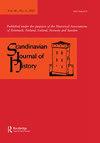Contested Households: Lodgers, Labour, and the Law in Rural Iceland in the Early 19th Century
IF 0.8
3区 历史学
Q1 HISTORY
引用次数: 0
Abstract
ABSTRACT The historiography of labour in pre-industrial Iceland has commonly portrayed it first and foremost as life-cycle service in rural households and has suggested that, in a European context, the Icelandic system of compulsory service – or vistarband – was exceptionally harsh due to its broad scope and inflexibility. This approach has been built primarily on demographics and a normative analysis of legal sources. Less attention has been paid to the everyday practices of workers and their employers (or the state) as they manoeuvred within and around the labour legislation to establish working relationships to make ends meet. Similarly, ambiguities within the legislation and discrepancies between law and practice have rarely been explored, nor has people’s understanding of the principal concepts of the labour laws, concepts such as ‘household’, ‘farm’ and ‘servant’, been scrutinized. This article invokes such questions and provides a microhistorical analysis of two court cases which illustrate the nuances and ambiguities of putting such a broad-reaching set of regulations into practice in a pre-industrial rural setting.竞争家庭:19世纪初冰岛农村的寄宿者、劳工和法律
摘要前工业化时期冰岛的劳动史学通常首先将其描述为农村家庭的生命周期服务,并表明,在欧洲背景下,冰岛的义务服务制度(或vistarband)由于其广泛的范围和灵活性而异常苛刻。这种方法主要建立在人口统计和对法律来源的规范分析的基础上。人们对工人及其雇主(或国家)的日常做法关注较少,因为他们在劳动立法范围内和周围活动,以建立工作关系来维持生计。同样,立法中的模糊性和法律与实践之间的差异很少被探讨,人们对劳动法的主要概念,如“家庭”、“农场”和“仆人”的理解也很少被仔细审查。本文援引了这些问题,并对两起法庭案件进行了微观历史分析,这两起案件说明了在工业化前的农村环境中实施如此广泛的一套法规的细微差别和模糊性。
本文章由计算机程序翻译,如有差异,请以英文原文为准。
求助全文
约1分钟内获得全文
求助全文
来源期刊

SCANDINAVIAN JOURNAL OF HISTORY
HISTORY-
CiteScore
1.10
自引率
20.00%
发文量
33
期刊介绍:
Scandinavian Journal of History presents articles on Scandinavian history and review essays surveying themes in recent Scandinavian historical research. It concentrates on perspectives of national historical particularities and important long-term and short-term developments. The editorial policy gives particular priority to Scandinavian topics and to efforts of placing Scandinavian developments into a larger context. Studies explicitly comparing Scandinavian processes and phenomena to those in other parts of the world are therefore regarded as particularly important. In addition to publishing articles and review essays, the journal includes short book reviews. Review essay proposals and polemical communications are welcomed.
 求助内容:
求助内容: 应助结果提醒方式:
应助结果提醒方式:


